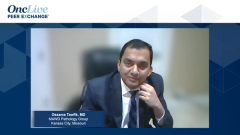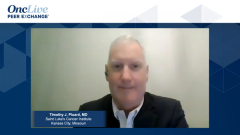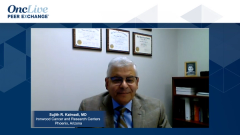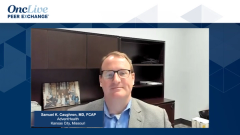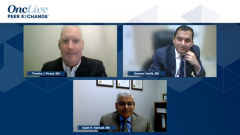
The Value of Molecular Tumor Boards and Multidisciplinary Care
Comprehensive discussion on the role of tumor boards—or more specifically, molecular tumor boards—in the optimal management of patients with cancer.
Episodes in this series

Transcript:
Samuel K. Caughron, MD, FCAP: So, molecular tumor boards at our institution are not common. Molecular tumor boards require a volume of patients and a volume of molecular testing and interesting findings that we have not found our institution reaches as a threshold. Rather, what we do is we incorporate interesting molecular results into our regular tumor boards. We’re fortunate to have 2 molecular pathologists within our care team, and both of us at our tumor boards can bring that molecular background to the discussion of a routine tumor board conversation. So, we do not utilize molecular tumor boards as such, and we have integrated that function within our regular tumor boards.
Timothy J. Pluard, MD:Sujith, I'm curious within your group, do you have a fairly large group in Phoenix? Do you guys have a molecular tumor board? Or do your pathologists organize that? Sujith?
Sujith R. Kalmadi, MD: We don't have a dedicated molecular tumor board. So, the 3 vendors which we use, namely, Foundation, Tempus, and Caris, all have their own molecular tumor boards. Any of our interesting cases get presented there. So, we make it a point to attend those tumor boards, and they have a nationwide tumor board for themselves.
Timothy J. Pluard, MD:It's great. Ossama, you participated in some molecular tumor boards. Tell us a little bit about your experience with that.
Ossama Tawfik, MD: Well, I believe in molecular boards as the way to go. Of course, it needs a champion that can be the key person that will gather people around because, as you know, from the pathology point of view, we have to serve tumor boards on every organ system nowadays and that's the way we practice. It has evolved the knowledge, and the demand has evolved that pathologists have to be as specialized as the oncologist in treatment of patients because it's not just one-size-fits-all. A tumor board is a centered way of communicating this new knowledge to others because it is an evolving field and it is important. Fortunately, in our team, we have 2 molecular pathologists which is very, very rare in private practice. Even in academia sometimes you don't have the luxury or in several academic institutions they don't have that luxury.
Timothy J. Pluard, MD:One of the things that we've done, as you know, Ossama, is have a molecular tumor board that actually meets weekly. [It’s] one of the things that has been immensely helpful for us because the clinicians are so incredibly busy, and they're trying to sift through just this voluminous amount of information. So, we have set it up.
Sujith R. Kalmadi, MD: I can give you an example, Tim?
Timothy J. Pluard, MD:Sure.
Sujith R. Kalmadi, MD: I had this very nice lady, a retired judge and non-smoker, that I was treating for lung cancer. She also had a melanoma, and in the charts it was kind of hiding that she actually had basal cell carcinoma as well. It was not very evident because we hadn’t gotten those reports from the dermatologist because they felt it wasn’t relevant. Anyway, I did test because of family history, and I got a PTCH1 mutation. So, I put it down in my chart, and I didn't make much out of it, so I sent it to a genetics counselor, and I had a discussion.
Very recently, she was in the hospital and had a CAT scan done which showed a cavitating lung lesion and lymph nodes in the mediastinum and, also, several bony lesions on the CAT scan. So, then I went ahead and ordered a PET scan, and then the PET scan showed nothing in the bone and showed the lymph nodes in the lungs with a high-level lymph node, so stage II disease. Then, I went back and looked at her genetic testing, so the PTCH1 stands for something called Gorlin syndrome. With Gorlin syndrome, it's very common to get benign bone lesions and basal cell. It was a very interesting case at our tumor board when we were reviewing the CAT scans and the PET scans. This one syndrome really helped us not to worry too much about the bone lesions and explained all the CT findings. Though, it was kind of something sitting in the background which came into the forefront once we got the diagnosis of lung cancer. Otherwise, I'm not sure I would have looked it up that way.
Timothy J. Pluard, MD:I think you're highlighting what a real challenge it is to get so much information that we may not be frankly wanting to get at that point. We're not looking for that, you weren't looking for that, but you came back.
There was a study done, it's probably 5 years ago now, and I don't remember the details of the study per se, but I do remember Jack West [MD] who was at Swedish at the time, now I think he's at City of Hope, but he wrote an editorial about how we had failed miserably in lung cancer because only 50% of patients had received targeted agents for the mutations that were detected. So, half the information that was being generated that could guide treatment decisions wasn't being utilized. I think that remains a big challenge and I think that challenge increases as the amount of information we get increases as well.
Ryan Haumschild, PharmD, MS, MBA: Our pharmacists are very involved in institutional tumor boards. We actually call them disease-state working groups. Within that, we've got to bring forward data. We've got to look through emerging biomarkers as well as emerging treatments and make sure that we're prepared to start that patient on treatment on time. That means that as therapies are getting approved, the pharmacists are recognizing what genomic panel needs to be included, and how early should we sequence this precision medicine panel so that we can pick the subsequent treatment. When we're at tumor boards, pharmacists get feedback.
Well, what about leveraging this phase 2 trial data or this basket trial data? Or, have we looked at this unique target for a patient population such as Lynch syndrome and pancreatic cancer? I think asking lots of questions is the role that pharmacists play. On top of that education, they also bring forward precision medicine into the treatment algorithms. So, when we have our tumor boards or disease-state working groups, they're bringing forward the companion diagnostics with the treatment and making sure that's built out correctly. They also make sure we have that genomic result prior to initiating treatment for the small molecule agents that are targeted. So, they play a huge role, and they're a huge part of the care team.
Transcript edited for clarity.


